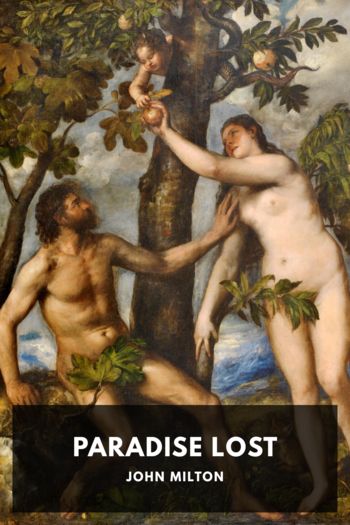The Wisdom of Father Brown by G. K. Chesterton (best english books to read .txt) 📕

- Author: G. K. Chesterton
Book online «The Wisdom of Father Brown by G. K. Chesterton (best english books to read .txt) 📕». Author G. K. Chesterton
After a silence he went on, with more than common gentleness: “It was a cruel will his wicked father made, and you see he did resent it a little. He hated the Roman money he had, and grew fonder of the real money denied him. He not only sold the Collection bit by bit, but sank bit by bit to the basest ways of making money—even to blackmailing his own family in a disguise. He blackmailed his brother from Australia for his little forgotten crime (that is why he took the cab to Wagga Wagga in Putney), he blackmailed his sister for the theft he alone could have noticed. And that, by the way, is why she had that supernatural guess when he was away on the sand-dunes. Mere figure and gait, however distant, are more likely to remind us of somebody than a well-made-up face quite close.”
There was another silence. “Well,” growled the detective, “and so this great numismatist and coin-collector was nothing but a vulgar miser.”
“Is there so great a difference?” asked Father Brown, in the same strange, indulgent tone. “What is there wrong about a miser that is not often as wrong about a collector? What is wrong, except … thou shalt not make to thyself any graven image; thou shalt not bow down to them nor serve them, for I … but we must go and see how the poor young people are getting on.”
“I think,” said Flambeau, “that in spite of everything, they are probably getting on very well.”
The Purple WigMr. Edward Nutt, the industrious editor of The Daily Reformer, sat at his desk, opening letters and marking proofs to the merry tune of a typewriter, worked by a vigorous young lady.
He was a stoutish, fair man, in his shirtsleeves; his movements were resolute, his mouth firm and his tones final; but his round, rather babyish blue eyes had a bewildered and even wistful look that rather contradicted all this. Nor indeed was the expression altogether misleading. It might truly be said of him, as for many journalists in authority, that his most familiar emotion was one of continuous fear; fear of libel actions, fear of lost advertisements, fear of misprints, fear of the sack.
His life was a series of distracted compromises between the proprietor of the paper (and of him), who was a senile soap-boiler with three ineradicable mistakes in his mind, and the very able staff he had collected to run the paper; some of whom were brilliant and experienced men and (what was even worse) sincere enthusiasts for the political policy of the paper.
A letter from one of these lay immediately before him, and rapid and resolute as he was, he seemed almost to hesitate before opening it. He took up a strip of proof instead, ran down it with a blue eye, and a blue pencil, altered the word “adultery” to the word “impropriety,” and the word “Jew” to the word “Alien,” rang a bell and sent it flying upstairs.
Then, with a more thoughtful eye, he ripped open the letter from his more distinguished contributor, which bore a postmark of Devonshire, and read as follows:
Dear Nutt—As I see you’re working Spooks and Dooks at the same time, what about an article on that rum business of the Eyres of Exmoor; or as the old women call it down here, the Devil’s Ear of Eyre? The head of the family, you know, is the Duke of Exmoor; he is one of the few really stiff old Tory aristocrats left, a sound old crusted tyrant it is quite in our line to make trouble about. And I think I’m on the track of a story that will make trouble.
Of course I don’t believe in the old legend about James I; and as for you, you don’t believe in anything, not even in journalism. The legend, you’ll probably remember, was about the blackest business in English history—the poisoning of Overbury by that witch’s cat Frances Howard, and the quite mysterious terror which forced the King to pardon the murderers. There was a lot of alleged witchcraft mixed up with it; and the story goes that a manservant listening at the keyhole heard the truth in a talk between the King and Carr; and the bodily ear with which he heard grew large and monstrous as by magic, so awful was the secret. And though he had to be loaded with lands and gold and made an ancestor of dukes, the elf-shaped ear is still recurrent in the family. Well, you don’t believe in black magic; and if you did, you couldn’t use it for copy. If a miracle happened in your office, you’d have to hush it up, now so many bishops are agnostics. But that is not the point. The point is that there really is something queer about Exmoor and his family; something quite natural, I dare say, but quite abnormal. And the Ear is in it somehow, I fancy; either a symbol or a delusion or disease or something. Another tradition says that Cavaliers just after James I began to wear their hair long only to cover the ear of the first Lord Exmoor. This also is no doubt fanciful.
The reason I point it out to you is this: It seems to me that we make a mistake in attacking aristocracy entirely for its champagne and diamonds. Most men rather admire the nobs for having a good time, but I think we surrender too much when we admit that aristocracy has made even the aristocrats happy. I suggest a series of articles pointing out how dreary, how inhuman, how downright diabolist, is the very smell and atmosphere of some of these great houses. There are plenty of instances; but you couldn’t begin with a better one than the Ear of the Eyres. By the end of the





Comments (0)